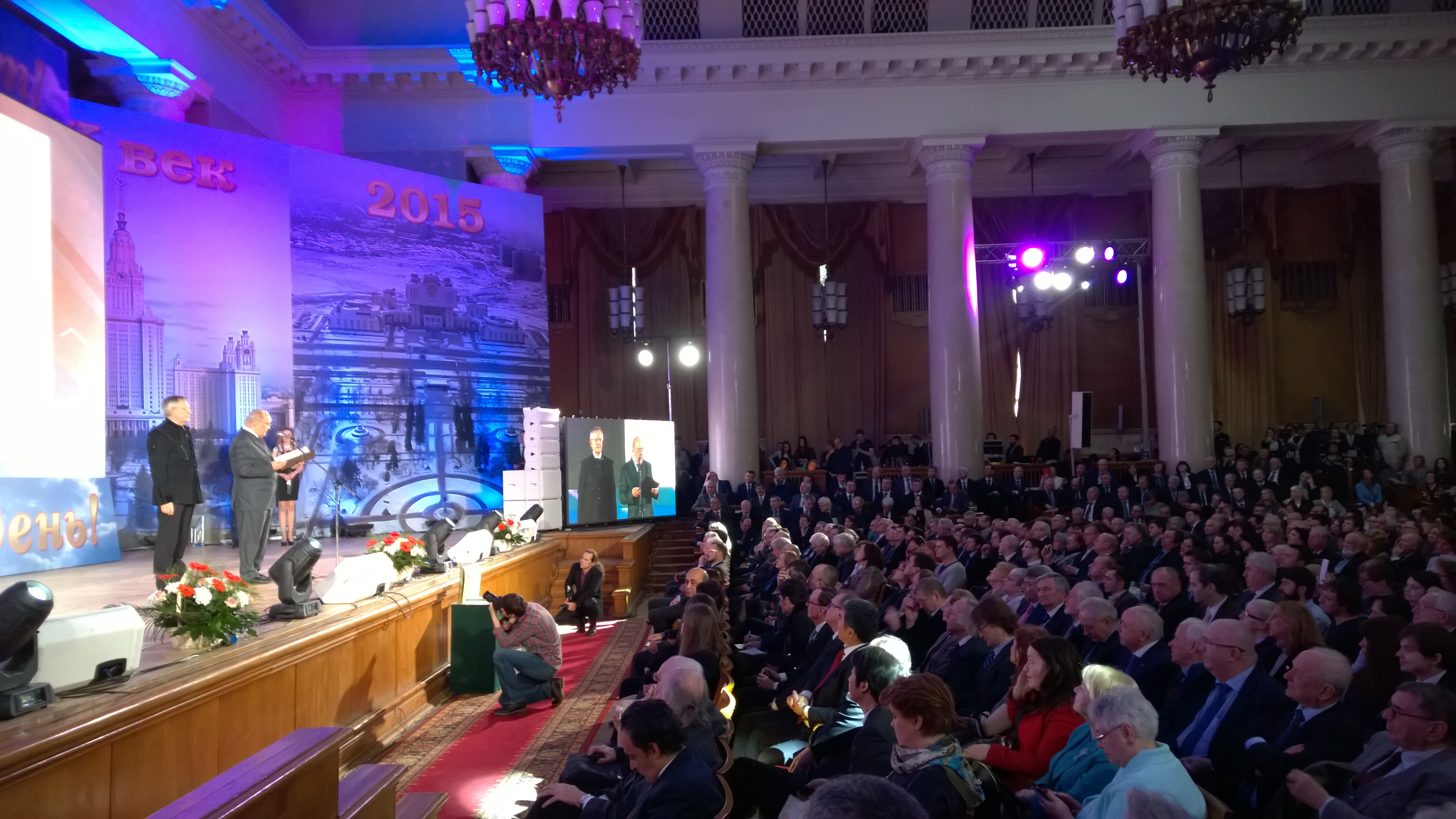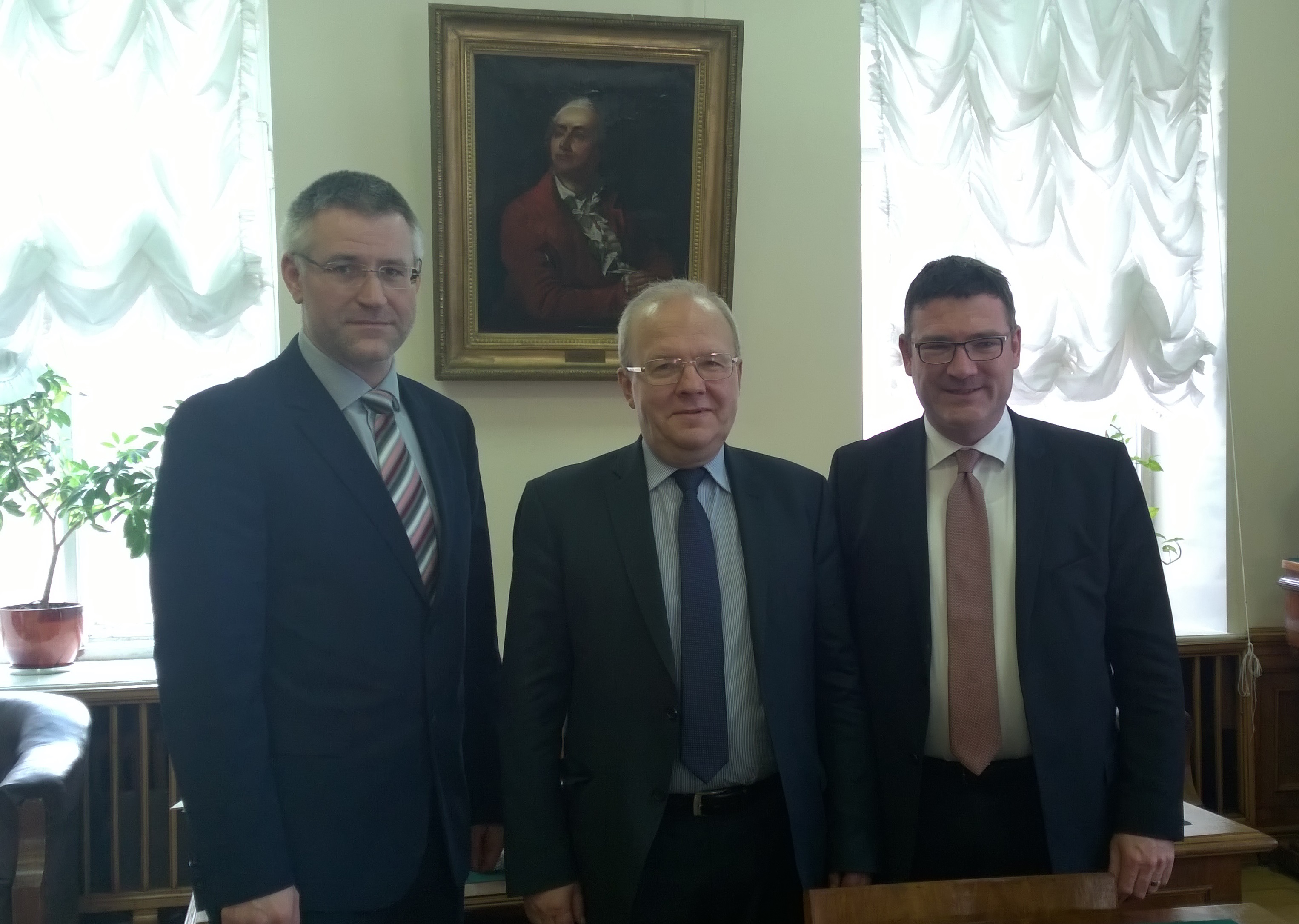Lomonosov Moscow State University (MSU) celebrates 260th anniversary
(01.04.15) At the start of this year Moscow State University (MSU), Russia's most famous university, celebrated its 260th anniversary. MSU was founded in 1755 on the recommendation of Mikhail Lomonosov, whose name it has borne since 1940. Today, with 40 000 students and 11 000 academic staff, it is the largest university in Russia and the most active in terms of research. To mark the anniversary, the rector of the university invited a large number of guests to share in the celebrations, including German partner universities and funding organisations such as the Deutsche Forschungsgemeinschaft (DFG, German Research Foundation).

The Rector of Bergakademie Freiberg is awarded an honorary professorship as part of the anniversary celebrations
One of the high points of the special event in the Great Hall, to which 2500 guests were invited, was the awarding of an honorary professorship to Professor Bernd Meyer, the rector of TU Bergakademie Freiberg (Freiberg University of Mining and Technology). TU Bergakademie Freiberg is one of the most well-known German universities to Russians because Mikhail Lomonosov was a student in both Marburg and Freiberg. It also maintains long-established partnerships with 15 Russian universities, including the National Mineral Resources University in St. Petersburg.
MSU frequently emerges as the best university in Russia by some distance in national and international rankings. It ranks 25th in the Times Higher Education World Reputation Rankings for 2015. It is more successful at securing third-party funding from national funding organisations such as the Russian Science Foundation (RSF) than any other research institute in the Russian Academy of Sciences (RAN). This is also reflected in the joint calls issued by the DFG and the Russian Foundation for Basic Research (RFFI).
For example, the DFG and RFFI are currently funding 17 bilateral cooperation projects at MSU – more than at any other Russian research institution. The largest long-term German-Russian project at MSU is the International Research Training Group RTG 1956, a partnership with the universities of Giessen and Marburg set up in 2006 to study enzyme complexes. As well as the life sciences, there are also supported projects in soil and plant science, mathematics, astrophysics, experimental and theoretical physics, polymer chemistry and process engineering. The new DWIH Research Atlas and the online database GEPRIS provide information about research projects funded by the DFG as well as on the people and institutions involved.

Stefan Kaufmann (right) and Jörn Achterberg (DFG Moscow) at MSU with Vice-Rector Alexei Khokhlov (centre)
Stefan Kaufmann, chair of the CDU/CSU parliamentary party in the Committee on Education, Research and Technology Assessment of the German Bundestag, saw MSU's impressive research capabilities for himself on a visit to the university in early March. In conversation with Vice-Rector Alexei Khokhlov, Head of Department for Innovations, Information and International Scientific Cooperation, and Jörn Achterberg (DFG Moscow), DFG-funded projects at Lomonosov University provided examples of best practice in bilateral university cooperation between Germany and Russia. Khokhlov, a physicist, member of the Presidium of the Russian Academy of Sciences (RAN) and chair of the scientific advisory council of the Russian Ministry of Education and Science (MON), has been actively involved in research cooperation with Germany for two decades. In 2013 he was awarded the Bundesverdienstkreuz at the University of Ulm, where he once led a project within the DFG Collaborative Research Centre "Hierarchical Structure Formation and Function of Organic-Inorganic Nanosystems" (CRC 569).